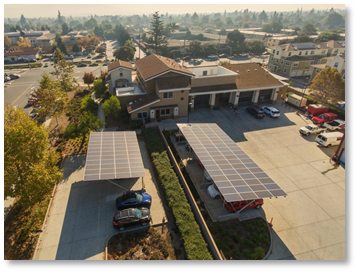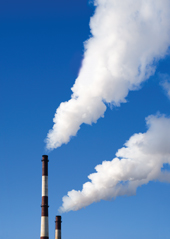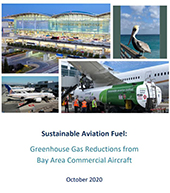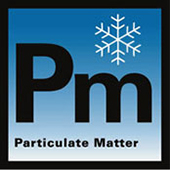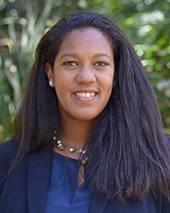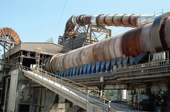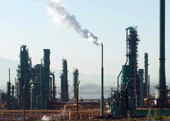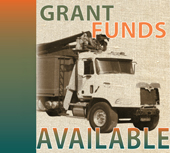|
|

|
|
|
|
February 2021 l Volume 2021-1
|
|
|
|
|
|
|
In this issue, you’ll find articles about a cutting-edge microgrid project funded by loans through the Air District’s Climate Tech Finance program, an upcoming workshop on rule amendments that will reduce refinery emissions, and a report on sustainable aviation fuel commissioned by the Air District. Other articles feature the Air District’s response to the U.S. EPA’s lack of action in revisiting the fine particle matter standard and the appointment of an Air District board member to the California Air Resources Board. Recent settlements with Lehigh Cement, Chevron and Schnitzer steel are also covered, and a summary of current grant opportunities is included.
|
|
|
|
|
|
|
|
|
|
|
|
|
|
Air District’s Climate Tech Finance Program Paves the Way for Innovative Microgrid Solutions Project
|
|
| | |
|
The Air District has awarded a loan guarantee to Gridscape Solutions, a developer of renewable energy microgrid solutions in California. Gridscape’s microgrids integrate several technologies, including solar panels and lithium-ion battery energy storage systems, to provide renewable power, clean emergency backup power and grid resiliency. Gridscape developed a proprietary, intelligent software called EnergyScope™, a distributed energy resource management system that optimizes microgrid assets and supports backup power and islanding.
This loan guarantee is the second project under the Air District’s Climate Tech Finance program. In partnership with the California Infrastructure Economic Development Bank and the Northern California Financial Development Corporation, the Climate Tech Finance team led a technology qualification and greenhouse gas analysis that deemed Gridscape eligible for a 90 percent loan guarantee. This loan guarantee supported Gridscape in securing a line of credit with River City Bank.
The core value of Climate Tech Finance is to support innovative climate projects. The Air District’s greenhouse gas analysis ensures that new technologies will reduce short- and long-term greenhouse gas emissions.
Gridscape Solutions is focused on deploying state of the art Microgrids integrated with EV charging solutions aimed at reducing the overall energy cost for sites and providing backup clean emergency power during Public Safety Power Shutoffs or other power disruption events. Gridscape’s projects are estimated to reduce 2,200 metric tons of carbon dioxide equivalent emissions per year.
|
|
|
|
|
|
|
|
|
|
|
|
Air District Hosts Workshop on Efforts to Reduce Emissions from Refinery Catalytic Cracking Units
|
|
| | |
|
The Air District is hosting a virtual public workshop on February 4, 2021, to discuss its development of draft amendments to Regulation 6 Rule 5: Particulate Emissions from Refinery Fluidized Catalytic Cracking Units. Fluidized catalytic cracking units are some of the largest individual sources of particulate matter emissions in the San Francisco Bay Area. Reductions of particulate matter are needed to ensure progress towards attainment of all state and national air quality standards and to achieve cleaner air and improved public health outcomes in the region.
At the workshop, the public, community advocates, local government and industries will have an opportunity to learn about the draft rule, ask questions of Air District staff and share feedback and ideas to inform the final rule-making process.
For workshop materials and information about how to attend the virtual workshop, visit the Air District’s Regulation 6, Rule 5 web page.
Interested parties are invited to submit written comments on the draft rule amendments and Workshop Report. Comments on the documents will be accepted during the workshop or may be submitted in writing to the Air District. The deadline to submit comments on these materials is Friday, February 12, 2021, at 5 PM.
For questions or to submit comments on the draft regulatory amendments, please contact David Joe, Assistant Manager of the Rule Development Section, at djoe@baaqmd.gov.
Following the workshop and the close of the public comment period, staff will assess the need for changes to the draft rule amendments. Staff may consider soliciting further input or may proceed to a public hearing before the Air District’s Board of Directors for their consideration of the staff’s proposal.
|
|
|
|
|
|
|
|
|
|
|
|
Air District Commissions Sustainable Aviation Fuel Report
|
|
| | |
|
A new report entitled, Sustainable Aviation Fuel: Greenhouse Gas Reductions from Bay Area Commercial Aircraft, commissioned by the Air District and examining the potential positive air quality effects of sustainable aviation fuel, has been released and is available on the Air District website. Sustainable aviation fuel, or SAF, is a drop-in replacement for conventional jet fuel that can significantly reduce full-fuel-cycle greenhouse gas emissions from jet aircraft engines. It is currently required to be used in a blend with conventional jet fuel, at up to 50 percent SAF by volume.
The world’s commercial aviation sector contributes roughly two-to-three percent of combustion-related greenhouse gas emissions. In California’s Bay Area, aviation contributes about six percent of transportation-related GHG emissions.
Commercial aviation companies have made important strides in reducing carbon emissions through aircraft fleet-efficiency improvements, but sustainable aviation fuel has emerged as the leading approach to further reducing GHG emissions from jet aircraft.
In this report, a high-level estimate was performed to roughly calculate the full fuel-cycle GHG reductions that could be realized by widely using SAF blends at the three largest Bay Area airports. It is estimated that GHG reductions from SAF blends would range from 0.47 million metric tons per year up to 4.7 million metric tons per year, depending on the specific blends, and based on 2019 emissions estimates.
A similar analysis was performed to estimate emission reductions of criteria air pollutants that could be realized within the Air District boundaries. For the best-case scenario, it is estimated that displacing all conventional jet fuel use at the three major airports with a 50 percent SAF blend could provide reductions in CO emissions of 2.27 tons per day, SOx emissions of 0.39 tons per day, and PM10 emissions of 0.28 tons per day.
This report was prepared by the clean transportation and energy consulting firm of Gladstein, Neandross & Associates (GNA), with input from Air District staff. It is the result of work sponsored and paid for, in whole or in part, by the Air District.
|
|
|
|
|
|
|
|
|
|
|
|
Air District Blasts Trump Administration for Failure to Protect Public Health
|
|
| | |
|
This December, the Air District condemned the U.S. Environmental Protection Agency’s lack of action in deciding to retain the existing National Ambient Air Quality Standards for particulate matter. Despite overwhelming scientific evidence and warnings from experts that keeping currently inadequate health limits for particulate matter in place could lead annually to thousands of premature deaths in the United States, the EPA chose not to follow this urgent advice and strengthen these standards.
“As air quality and public health experts have pleaded with the Trump Administration to strengthen standards for particulate matter amid the worst public health crisis this country has faced in more than a century, the EPA did nothing,” said Jack Broadbent, executive officer of the Bay Area Air District. “This failure to act to protect public health at such a crucial juncture in our history represents a colossal failure on the part of our federal government and will have serious public health implications, especially in communities already heavily impacted by air pollution.”
The EPA’s own Integrated Science Assessment from late last year includes studies that identify PM2.5 as a significant public health threat, underscoring the need to lower the federal standard for this air pollutant. This assessment echoes that of the nongovernmental Independent Particulate Matter Review Panel, made up of experts from the former EPA Particulate Matter Review Panel, that was dismissed by the Trump Administration in 2018. That panel had already concluded that the current PM2.5 standards are insufficient to protect public health.
To make this matter even more critical, preliminary studies also indicate that those recovering from COVID-19 may be more susceptible to health impacts from PM2.5 levels in the air.
|
|
|
|
|
|
|
|
|
|
|
|
Air District Board Member Davina Hurt Appointed to CARB
|
|
| | |
|
In December, Governor Gavin Newsom appointed Air District Board Member Davina Hurt to the California Air Resources Board. Hurt has served on the Air District’s Board of Directors since January 2020 and is chair of the Ad Hoc Committee on Equity Access and Inclusion. She is a Belmont city council member, attorney and environmental advocate. Hurt has also served as mayor, vice mayor and planning commissioner for the City of Belmont.
The California Air Resources Board addresses California’s unique air quality challenges by setting the state’s stricter emissions standards for a range of statewide pollution sources including vehicles, fuels, and consumer products.
CARB consists of 16 members. Twelve are appointed by the governor and confirmed by the state Senate. The other four include two who represent environmental justice communities and two nonvoting members appointed for legislative oversight, one each from the state Senate and Assembly. In July 2018, the CARB Board established staggered six-year terms for voting members.
|
|
|
|
|
|
|
|
|
|
|
|
Court Approves Lehigh Cement Settlement to Reduce Air Emissions in Cupertino
|
|
| | |
|
This fall, the U.S. District Court for the Eastern District of Pennsylvania approved a consent decree lodged last year by the Air District, U.S. Department of Justice, U.S. Environmental Protection Agency and other local agencies with Lehigh Cement and Lehigh White Cement to reduce harmful air emissions. The settlement resolves alleged violations of the Clean Air Act and will reduce emissions at Lehigh Cement and Lehigh White Cement portland cement manufacturing plants nationwide, including their Cupertino plant. As part of the settlement, Lehigh will invest $12 million in pollution control technology at 11 of their portland cement manufacturing plants, three of which are in California.
In addition to investing in pollution control technology, Lehigh will:
- Pay $119,353 to the Air District as part of a total of $1.3 million in civil penalties to U.S. EPA and state and local regulatory agencies
- Be required to meet tightened emission limits of nitrogen oxide and sulfur dioxide
- Embark on a “test and set” protocol over the next year to determine the lowest possible sulfur dioxide emissions rate that can be attained at the Cupertino facility
- Address visible emissions of kiln stack plumes by preparing a protocol specifically for the Cupertino facility which details all steps taken to mitigate excess visible emissions
Nitrogen oxide and sulfur dioxide are two key pollutants emitted from cement plants that are damaging to the environment and can cause health impacts. The reduction of these pollutants is also expected to reduce fine particulate matter emissions from the facility.
|
|
|
|
|
|
|
|
|
|
|
|
Air District Settles Case with Chevron USA Inc.
|
|
| | |
|
In December, the Air District announced that Chevron USA Inc. agreed to pay $147,000 to settle violations at its refinery in Richmond. The settlement covers 29 Notices of Violation issued for air quality violations that took place during the years 2016-2018. The violations addressed in this settlement include:
- Several Notices of Violation for flaring in violation of the federal New Source Performance Standard
- An odor nuisance Notice of Violation stemming from complaints in San Francisco that occurred after flaring at the refinery
- An odor nuisance Notice of Violation stemming from complaints in the Richmond area related to restarting refinery operations after a power outage
- A sulfur dioxide exceedance at a sulfur recovery operation
- An excess of visible emissions at the fluid catalytic cracking unit
All the violations that led to this settlement have been corrected.
The Air District issues Notices of Violation when facilities violate a specific air quality regulation or rule. Violators are generally required to respond to the notice within ten days and submit a description of the actions they will take to correct the problem. These actions can include shutting down certain operations immediately or changing operations or equipment to come into compliance.
All settlement funds will be used to fund Air District activities such as the inspection and enforcement activities that led to this settlement.
|
|
|
|
|
|
|
|
|
|
|
|
Air District Settlement with Schnitzer Steel to Reduce Air Emissions in West Oakland
|
|
| | |
|
The Air District and Schnitzer Steel have entered into a compliance and settlement agreement to resolve emissions exceedances from metal shredding operations at Schnitzer Steel’s Oakland metal shredding facility. Under the agreement, Schnitzer Steel will install and commence operating equipment to abate precursor organic compound emissions by December 31, 2022, and pay $500,000 in civil penalties to resolve the emissions violation, with $100,000 waived if it completes the abatement project by the end of December 2022. If Schnitzer Steel fails to complete the project by the end of December 2022, it must pay additional civil penalties.
The Schnitzer Steel facility in West Oakland is a scrap metal recycling and metal shredding operation occupying approximately 26.5 acres adjacent to the Oakland Inner Harbor waterfront and the Port of Oakland. Bulk scrap is delivered to the facility by both rail and truck. The processed ferrous scrap is stockpiled at the facility until loaded at the facility’s docks into cargo ships.
|
|
|
|
|
|
|
|
|
|
|
|
Air District Offers Millions in Grants
|
|
| | |
|
The Air District administers a number of grant funding programs that offer incentives for clean air projects. Grant Funding for Clean Air Projects
Grant programs for Bay Area businesses and public agencies:
Equipment/Engine Replacement/Repower or Conversion, and Infrastructure
- Carl Moyer Program – $12 million is available for eligible projects that upgrade or replace on-road vehicles, school buses, transit buses, off-road and agricultural equipment, marine equipment, locomotives, and eligible infrastructure projects that support advanced clean vehicles and technology. Applications are being accepted on a first-come, first-served, basis until all funds are awarded. www.baaqmd.gov/moyer
- Community Health Protection Grant Program – $28 million is available for eligible projects that reduce toxic air emissions and ozone-forming pollutants from mobile and stationary sources by replacing old, high-polluting vehicles and equipment. Priority is given to projects in the AB 617-identified communities of West Oakland, Richmond-San Pablo, East Oakland/San Leandro, Eastern San Francisco, Pittsburg-Bay Point area, San Jose, Tri-Valley area, and Vallejo. Community input will play an important role in guiding the Air District’s outreach and process for identifying priority projects. Applications are being accepted on a first-come, first-served basis until all funds are awarded. www.baaqmd.gov/ab617grants
- Lower-Emission School Bus Program – Funding is available for public school districts, Joint Powers Authorities (JPAs), and contracted fleets in the Bay Area for bus replacements, engine repowers or electric conversions, natural gas tank replacements, and electric charging and alternative fueling infrastructure projects. Applications are being accepted on a first-come, first served basis until all funds are awarded. www.baaqmd.gov/lesbp
- Charge! Program - The Charge! Program provides grant funding to offset the cost of purchasing and installing new publicly accessible chargers for light-duty electric vehicles, or EVs, at workplaces, destinations, transit parking locations, along transportation corridors, and at multi-unit dwelling facilities. A total $6 million in grant funding is available for organizations, including governments, businesses, and nonprofits. This program is open and accepting applications now. The deadline for receiving applications for Charge! is 4 PM on March 18, 2021. www.baaqmd.gov/charge
- COMING SOON! Other project categories funded by Volkswagen NOx Mitigation Trust Fund - Solicitations for light-duty electric-vehicle infrastructure projects and zero-emission freight and marine projects are anticipated to open early 2021. Visit: https://www.californiavwtrust.org/ to learn more about these opportunities and sign up for email alerts.
- Loan Guarantees and Low-interest Financing: Climate Tech Finance Program – Subsidized financing is available to help Bay Area facilities adopt emerging technologies that reduce greenhouse gas emissions. Public facilities can apply for loans ranging from $500,000 to $30 million, up to 30-year terms. Small businesses can apply for loan guarantees up to 90 percent. This program is open and accepting applications now. www.baaqmd.gov/ctf
Grant programs available to Bay Area residents:
- Light-Duty Vehicle Replacement – The Clean Cars for All Program is open to all income-qualified Bay Area residents. The program provides varying incentives to retire older, high-polluting vehicles and replace them with newer, cleaner, vehicles or with alternative transportation options (e.g. Clipper card). Eligible vehicles for purchase or lease include hybrid electric, plug-in hybrid, or electric vehicles. This program is open and accepting applications now. www.baaqmd.gov/cleancarsforall
- Passenger Car and Light-Duty Truck Retirement – The Vehicle Buy Back Program pays Bay Area residents $1,200 per vehicle to turn in their operable, registered, model year 1997 and older passenger car or light-duty truck for scrapping. www.baaqmd.gov/vbb
- COMING SOON! Wood Smoke Reduction – This program is scheduled to open in mid-2021 and will offer financial incentives to encourage Bay Area homeowners to replace qualifying wood-burning devices with zero-emission hear pumps. Priority will be given to qualifying low-income applicants and projects that benefit overburdened communities in the Bay Area. www.baaqmd.gov/woodsmokegrant
Other state-wide grant programs funded by Volkswagen NOx Mitigation Trust:
- Volkswagen NOx Mitigation Program – Zero-Emission Class 8 Freight and Port Drayage Trucks –This category is administered by the South Coast Air Quality Management District and is intended to support the expansion of zero-emission truck availability in the heaviest weight class. Vehicles eligible for replacement include Class 8 freight trucks (including waste haulers, dump trucks, and concrete mixers) or their engines (2012 model year and older). This category is currently oversubscribed; however, the program will remain open and applications will continue to be accepted in order to generate a back-up list of applications. Projects placed on the back-up list will only be considered if returned or additional funds become available. https://xappprod.aqmd.gov/vw/zero-emission.html
- Volkswagen NOx Mitigation Program - Zero-Emission Transit and Shuttle Buses – Up to $10 million is available to owners of bus fleets that operate in California to support early adoption of zero-emission bus technologies to reduce harmful exposure for the state’s most sensitive populations. This program is administered by the San Joaquin Valley Air Pollution Control District. This solicitation is open and accepting applications for transit and shuttle buses on a first-come, first-served basis. http://vwbusmoney.valleyair.org/
|
|
|
|
|
|
|
|
|
|
|
Air District Events
|
|
This spring, the Air District and Spare the Air will be participating in the following outreach event.
March
Sonoma Home Show (tentative, COVID-pending) - Santa Rosa
March 19-21
|
|
|
|
|
|
|
|
|
|


